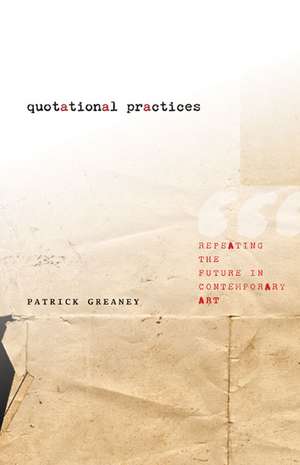Quotational Practices: Repeating the Future in Contemporary Art
Autor Patrick Greaneyen Limba Engleză Paperback – mar 2014
Literature and art have always depended on imitation, and in the past few decades quotation and appropriation have become dominant aesthetic practices. But critical methods have not kept pace with this development. Patrick Greaney reopens the debate about quotation and appropriation, shifting away from naïve claims about the death of the author. In interpretations of art and literature from the 1960s to the present, Quotational Practices shows how artists and writers use quotation not to undermine authorship and originality, but to answer questions at the heart of twentieth-century philosophies of history.
Greaney argues that quotation is a technique employed by art and philosophy to build ties to the past and to possible futures. By exploring quotation’s links to gender, identity, and history, he offers new approaches to works by some of the most influential modern and contemporary artists, writers, and philosophers, including Walter Benjamin, Guy Debord, Michel Foucault, Marcel Broodthaers, Glenn Ligon, Sharon Hayes, and Vanessa Place.
Ultimately, Quotational Practices reveals innovative perspectives on canonical philosophical texts as well as art and literature in a wide range of genres and mediums—from concrete poetry and the artist’s book to performance, painting, and video art.
Preț: 137.29 lei
Preț vechi: 170.32 lei
-19% Nou
Puncte Express: 206
Preț estimativ în valută:
26.27€ • 27.48$ • 21.82£
26.27€ • 27.48$ • 21.82£
Carte indisponibilă temporar
Doresc să fiu notificat când acest titlu va fi disponibil:
Se trimite...
Preluare comenzi: 021 569.72.76
Specificații
ISBN-13: 9780816687381
ISBN-10: 0816687382
Pagini: 224
Ilustrații: 18
Dimensiuni: 140 x 216 x 25 mm
Greutate: 0.34 kg
Ediția:1
Editura: University of Minnesota Press
Colecția Univ Of Minnesota Press
ISBN-10: 0816687382
Pagini: 224
Ilustrații: 18
Dimensiuni: 140 x 216 x 25 mm
Greutate: 0.34 kg
Ediția:1
Editura: University of Minnesota Press
Colecția Univ Of Minnesota Press
Notă biografică
Patrick Greaney is associate professor of German and comparative literature at the University of Colorado at Boulder. He is author of Untimely Beggar: Poverty and Power from Baudelaire to Benjamin (Minnesota, 2008).
Cuprins
Contents
Introduction: A History of the Present
1. The Transformation of Authorship2. Insinuation: Détournement and Gender in Guy Debord3. Marcel Broodthaers, an Artist in Quotation Marks4. The Aesthetics of Administration: Heimrad Bäcker's transcript5. Making History: Sharon Hayes, Vanessa Place, and Glenn Ligon
AcknowledgmentsNotesIndex
Introduction: A History of the Present
1. The Transformation of Authorship2. Insinuation: Détournement and Gender in Guy Debord3. Marcel Broodthaers, an Artist in Quotation Marks4. The Aesthetics of Administration: Heimrad Bäcker's transcript5. Making History: Sharon Hayes, Vanessa Place, and Glenn Ligon
AcknowledgmentsNotesIndex
Recenzii
"Patrick Greaney’s argument that we might understand history as a sort of utopian subjunctive is provocative and perfectly pitched. This is the kind of book the most ambitious critic aspires to write." —Craig Dworkin, author of No Medium
"In this groundbreaking and provocative study of the practice of quotation at the heart of contemporary conceptual writing and art, Patrick Greaney challenges the view that the use of quotation spells the end of authorship, of the individual voice. On the contrary, he argues, quotation must be understood in its historical function, its questioning of the past’s unrealized possibilities—possibilities for the present and even the future. Laying to rest once and for all the notion that citing the texts of others is little more than inspired plagiarism, Greaney provides a fascinating study of a philosophical practice that he calls, after Foucault, ‘the frugal lyricism of quotation.’" —Marjorie Perloff, author of Unoriginal Genius: Poetry by Other Means in the New Century
Descriere
Patrick Greaney reopens the debate about quotation and appropriation, shifting away from naïve claims about the death of the author. In interpretations of art and literature from the 1960s to the present, Quotational Practices shows how artists and writers use quotation not to undermine authorship and originality, but to answer questions at the heart of twentieth-century philosophies of history.
